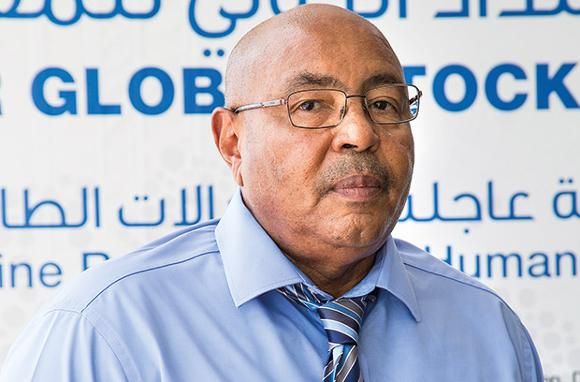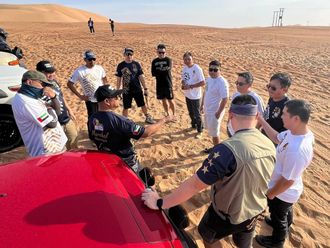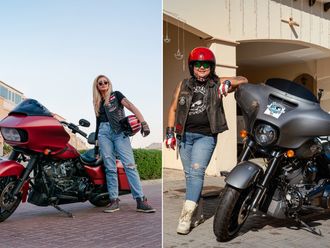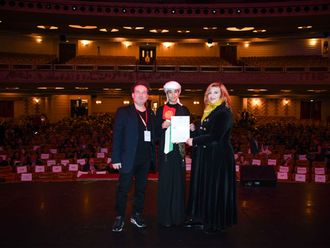
Soliman Mohamed Daud shows me a few dining table-sized flat-pack cartons neatly stacked in the cavernous warehouse of UNHCR’s Dubai Supply Office.
Smiling, the avuncular gentleman then leads me another area of the warehouse where a modest structure of four walls with a sloping roof of soft canvas stands.
‘Do you know,’ says the senior global supply officer, ‘it takes just four hours to set up a shelter like this from the flat packs you saw earlier.’
The walls of the shelter are made of white fibreglass sheets firmly bolted to a steel frame. ‘The technology used to make this shelter is very simple,’ he says. The instructions to assemble it are clear and very much Ikea-style and can be put together even by unskilled people.
‘These are an improvement on the earlier structures,’ says Soliman. ‘The new ones come equipped with solar lamps and are suitable for a family of five and can be separated by a curtain to a living and cooking areas ’
Most recently these shelters were shipped to Iraq to help refugees cope during the harsh winters, he says.
Offering shelter to needy people is just one part of UNHCR’s mission. ‘We respond to humanitarian emergencies which are a result of any natural or man-made disasters or conflicts,’ says Soliman. ‘Such crisis situations could force people to leave their homes and part of responsibility is to provide shelters for such people.’
The figures tell a harrowing tale. According to the UN agency, more than 65 million people around the world have been forced to leave their homes. Among them are over 21 million refugees, and what is extremely worrying is that over half of them are under the age of 18.
That’s not all. Nearly 34,000 people, says the agency, are forcibly displaced every day as a result of conflict or persecution.
The UNHCR’s Dubai Supply office stockpiles emergency shelter assistances that can be rushed in 72 hours or less to any crisis point. ‘We work on the premise that if there’s a disaster and people start moving in large numbers, there are often no big public buildings where such people can stay. We offer them assistance to stay until a long term solution is found or when they can return to their homes,’ he says.
While the UN body also has emergency stockpiles in Malaysia, Panama, Spain and Italy, the depot in Dubai is the largest holding tents, blankets, plastic sheeting, mosquito nets, kitchen sets jerry cans and more which can meet the needs of 350,000 people.
‘Normally, within 24 hours we would be able to send a 747 aircraft full of supplies depending on the crisis,’ says Soliman.
Although the office is staffed by just five members, they have partnerships with specialised logistic companies for quick response to a call for aid.
When was the most recent call for help? I ask Soliman.
‘Two days ago,’ he says.
The call emanates from the UNHCR’s office in Budapest which coordinates aid flow. ‘There are a set of standard operating procedures which we follow to start moving things,’ he says.
The UNHCR has field teams who make an initial assessment to determine the number of shelter units for instance that are required. ‘They will brief our head quarters in Geneva which will inform the emergency section in Budapest. We receive instructions from them on when, where and how many units to ship or airlift.’
The office in Dubai does more than just rush shipments. ‘We also conduct regular quality assurance measures on the stuff that arrives here,’ says Destamena Vinodh, supply associate based here. ‘We ensure that everything we buy is of a certain quality. For instance, the jerry cans are subjected to a drop test.’ A few randomly picked cans are filled with water and dropped from a height of about 2m – the height of an average person who will be carrying it on their head to fetch water – to see if it bursts upon impact.
Cooking utensils too are checked for leakages and if their handles are firm while blankets are checked for tears.
‘Blankets and tents are often the most important things a refugee requires so all care is given to ensure they are of the highest quality,’ says Soliman.
He then leads us to a smaller, highly restricted room where things such as bullet proof vests and bullet proof helmets are stocked. Sporting the vests that weigh around 14 to 16kg must perhaps be akin to carrying around a sauna and as uncomfortable and sweat-inducing. ‘But they can be very important to volunteers and the UN team on the ground in some hotspots,’ says Soliman.
As we prepare to leave the warehouse, I ask him what the set of long poles are for. ‘They are street lights,’ he says. ‘They come with solar lamps can be erected easily.’
You have pretty much everything covered, I tell him.
‘We have to be,’ says Soliman. ‘The idea is to do as much as possible to make the refugee family immediately comfortable and stress free.’












